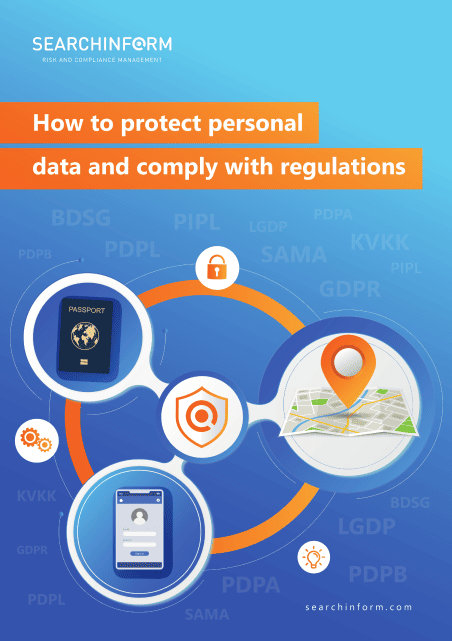How to Protect Data Subjects Under the GDPR
- What is a data subject?
- Protected Personal Data under GDPR:
- Data Subjects' Rights Under the GDPR
- Transparency and Information:
- Control over data:
- Objections and decision-making:
- Additional rights:
- Data subject obligations under the GDPR
- 1. Providing accurate personal data:
- 2. Reporting data breaches:
- 3. Cooperating with supervisory authorities:
- 4. Notify Controllers of Changes:
- How to Protect Data Subjects Under the GDPR
- 1. Implement Strong Technical and Organizational Security Measures:
- 2. Obtain Informed and Explicit Consent:
- 3. Process Data Only for Legitimate Purposes:
- 4. Refrain from Selling or Sharing Data Without Consent:
- 5. Delete Data When No Longer Needed:
- Additional Considerations:
- Empower Data Subject Rights: Secure Your Data with FileAuditor
-
-
-
-
-
-
- Understanding Financial Statement Fraud and Cybersecurity
- Combatting Fund Transfer Fraud with Cybersecurity Measures
- Combatting Invoice Fraud: Cybersecurity Strategies for Businesses
- Mobile Payment Fraud: Understanding the Risks and Prevention Strategies
- Online Banking Fraud: How to Stay Protected
- Understanding Payment Card Fraud and How to Prevent It
- Cyber Tax Fraud: Understanding and Preventing It
- Understanding Transaction Fraud in Cybersecurity
-
-
-
-
-
-
-
-
-
-
-
- Breach Attacks: Comprehensive Guide
- Cyber Attacks on Banks: Threat Landscape and Countermeasures
- Understanding Cyber Attack Vectors: the Anatomy of Cyber Threats
- Cyber Attacks in Healthcare
- Understanding Cyber Attacks on Critical Infrastructure
- Combatting Government Cyber Attacks: Strategies and Solutions
- State-Backed Cyber Attacks: Insights and Solutions
- Supply Chain Attacks
- Cyber Attack Prevention: Practical Tips and Solutions
- Types of Cyber Attacks: Understanding the Threats
-
-
- A Comprehensive Guide to Access Control Lists (ACLs)
- The Threat of Broken Access Control: How to Protect Your Systems?
- Discretionary Access Control (DAC)
- Understanding the Core Concepts of Mandatory Access Control
- Network Access Control: Key Strategies and Implementation Tips
- Understanding Non-Discretionary Access Control (NDAC)
- Understanding Access Control Policies for Enhanced Security
- Role Based Access Control (RBAC): A Comprehensive Guide
- Rule Based Access Control (RuBAC): A Comprehensive Guide
-
- Biometrics: What Is It and How Does It Work?
- What is Data Access and Why is it Important?
- What is Data Access Control (DAC)?
- What is Federated Identity and Federated Identity Management?
- IAM: Identity and Access Management
- Machine Identity Management
- Microsoft Identity Manager (MIM): A Comprehensive Overview
-
-
-
-
-
-
- Nonpublic Personal Information: What It Is and Why It Matters
- PII Data Classification: Importance, Challenges, and Best Practices
- Personal Information Protection: How to Protect Your Personal Information
- PHI vs PII: A Comparative Analysis of Protected Health Information and Personally Identifiable Information
- Understanding Personally Identifiable Information (PII) Protection
-
-
-
-
-
-
-
-
-
-
-
-
What is a data subject?
A data subject, in the context of data protection regulations like the General Data Protection Regulation (GDPR), is any living individual whose personal data is collected, held, or processed by an organization. This personal data can be used to identify them, directly or indirectly.
Here's who is considered a GDPR data subject:
- Natural persons: Only living individuals can be data subjects. Corporations, organizations, and deceased individuals are not GDPR data subjects.
- Identifiable individuals: The key aspect is identification. GDPR Data subjects can be directly identified through names, email addresses, or ID numbers. However, they can also be indirectly identified through a combination of factors like location data, online identifiers, or physical characteristics.
- EU residents: While the GDPR applies broadly, GDPR data subject rights under it primarily encompass individuals residing within the European Union.
Protected Personal Data under GDPR:
The GDPR protects a wide range of personal data, broadly categorized as:
- Basic information: Names, addresses, phone numbers, email addresses, identification numbers (social security numbers, passport numbers, etc.).
- Online identifiers: IP addresses, cookies, online tracking data, device identifiers, social media profiles.
- Physical, physiological, and genetic data: Biometric data (fingerprints, facial recognition), DNA, medical records.
- Economic and financial data: Bank account details, income, credit card information, transaction history.
- Political and religious beliefs, racial or ethnic origin, sexual orientation, and trade union membership: These are considered special categories of personal data and require stricter protection under the GDPR.
Remember: This is not an exhaustive list, and the specific types of data protected may vary depending on the context and applicable data protection laws.
Data Subjects' Rights Under the GDPR
The General Data Protection Regulation (GDPR) grants individuals, known as data subjects, a wide range of rights regarding their personal data. These rights empower individuals to control how their data is collected, used, and stored by organizations.
Here are some of the key GDPR data subject rights:
Transparency and Information:
- Right to be informed (Articles 12-14): Individuals have the right to be informed about the collection and use of their personal data. This includes the identity and contact details of the data controller, the purposes of the processing, the legal basis for processing, the categories of personal data collected, and the data retention period.
- Right of access (Article 15): Individuals have the right to request access to their personal data and obtain a copy of it. This includes the right to know the source of the data, if it was not obtained directly from the individual.
Control over data:
- Right to rectification (Article 16): Individuals have the right to request the correction of inaccurate or incomplete personal data.
- Right to erasure ("right to be forgotten") (Article 17): Individuals have the right to request the deletion of their personal data under certain circumstances, such as if it is no longer necessary for the purposes for which it was collected or if consent has been withdrawn.
- Right to restriction of processing (Article 18): Individuals have the right to request that their personal data be restricted from processing, such as for marketing purposes or during the rectification process.
- Right to data portability (Article 20): Individuals have the right to receive their personal data in a machine-readable format and transmit it to another controller without hindrance.
Its discovery entails:
Objections and decision-making:
- Right to object (Article 21): Individuals have the right to object to the processing of their personal data for certain purposes, such as direct marketing or profiling.
- Right to object to automated decision-making (Article 22): Individuals have the right to object to decisions made solely by automated means, such as algorithms, that have a significant impact on them.
Additional rights:
- Right to withdraw consent (Article 7): Individuals have the right to withdraw their consent to the processing of their personal data at any time.
- Right to lodge a complaint (Article 77): Individuals have the right to lodge a complaint with a supervisory authority if they believe their data protection rights have been violated.
It's important to note that these rights are not absolute and may have limitations and exceptions depending on the specific circumstances. Additionally, organizations have certain obligations to comply with individuals' requests within specific timeframes.
Data subject obligations under the GDPR
While the GDPR primarily focuses on obligations for organizations that handle personal data, it also outlines certain responsibilities for individuals. These obligations are essential for ensuring the accuracy and security of personal data, as well as facilitating effective enforcement of the GDPR.
1. Providing accurate personal data:
- GDPR Data subjects must ensure personal data they provide is accurate and up-to-date.
- This includes correcting any errors or informing the organization holding the data about changes.
- Organizations may take reasonable steps to verify accuracy, but the primary responsibility lies with the data subject.
2. Reporting data breaches:
- While organizations have primary responsibility for reporting data breaches, GDPR data subjects should inform organizations if they suspect a breach of their personal data.
- This prompt action can facilitate timely investigation and mitigation of potential harm.
3. Cooperating with supervisory authorities:
- GDPR Data subjects are obligated to cooperate with supervisory authorities (e.g., data protection agencies) in investigations.
- This may involve providing information or evidence related to potential GDPR violations.
4. Notify Controllers of Changes:
- GDPR Data subjects should inform controllers of any changes to their personal data, such as a change of address or email, in a timely manner.
- This allows controllers to maintain accurate records and comply with GDPR's accuracy principles.

How to Protect Data Subjects Under the GDPR
1. Implement Strong Technical and Organizational Security Measures:
Encryption: Protect sensitive data at rest and in transit using robust encryption algorithms.
Access Controls: Enforce strict access controls, limiting access to personal data to authorized individuals only.
Data Loss Prevention (DLP): Implement DLP solutions to prevent unauthorized disclosure or transfer of personal data.
Regular Security Assessments and Updates: Conduct regular security assessments to identify and address vulnerabilities, and promptly apply security patches and updates.
Incident Response Plans: Establish clear incident response plans to address data breaches effectively and timely.
Training and Awareness: Educate employees on data protection policies and best practices to ensure secure handling of personal data.
2. Obtain Informed and Explicit Consent:
Clear and Transparent Information: Provide GDPR data subjects with clear and understandable information about:
- Purposes of data processing
- Types of data collected
- How data will be used and shared
- Retention periods
- Their rights under GDPR
Unequivocal Consent: Obtain clear and affirmative consent, either through a written statement or a clear affirmative action (e.g., opt-in checkbox).
Refrain from Pre-Ticked Boxes: Avoid pre-ticked consent boxes or any deceptive practices that imply consent.
Easy Withdrawal of Consent: Allow data subjects to withdraw consent easily at any time.
detects incidents and performs
The system identifies:
3. Process Data Only for Legitimate Purposes:
Identify Lawful Basis: Ensure you have a lawful basis for processing personal data, such as:
- Consent
- Contractual necessity
- Legal obligation
- Vital interests
- Public interest
- Legitimate interests (carefully balanced against individual rights)
Document Purposes: Clearly document the specific purposes for processing personal data.
Limit Data Collection: Collect only the minimum amount of personal data necessary for those purposes.
4. Refrain from Selling or Sharing Data Without Consent:
- Prohibit Sale Without Consent: Do not sell personal data without explicit consent.
- Restrict Data Sharing: Share personal data with third parties only with GDPR data subjects' consent or under a legal obligation.
- Secure Data Transfers: Implement safeguards when transferring data to third parties, such as data processing agreements and appropriate security measures.
5. Delete Data When No Longer Needed:
- Establish Retention Periods: Determine and document specific retention periods for different categories of personal data.
- Erase Data After Purpose Fulfilled: Delete personal data once the purpose for processing is no longer valid.
- Provide Data Deletion Mechanisms: Allow GDPR data subjects to request deletion of their personal data under certain circumstances (e.g., right to be forgotten).
Additional Considerations:
- Data Protection by Design and by Default: Integrate data protection principles into all systems and processes from the outset.
- GDPR Data Subject Rights: Respect data subjects' rights to access, rectification, erasure, restriction of processing, data portability, and objection to processing.
- Appoint Data Protection Officer (DPO): If required, appoint a DPO to oversee compliance with GDPR.
- Cooperate with Supervisory Authorities: Respond promptly to inquiries and requests from data protection authorities.
Empower Data Subject Rights: Secure Your Data with FileAuditor
SearchInform FileAuditor can be a valuable tool for organizations that are subject to data protection regulations, such as the GDPR. By using FileAuditor, you can help to protect the personal data of your customers, employees, and other stakeholders. Some of the benefits of using SearchInform FileAuditor for data subject protection are:
Data discovery and classification: FileAuditor can help you discover and classify all of the personal data that is stored on your systems, even if it is buried in unstructured files like emails, PDFs, and log files. This is essential for complying with data subject rights requests, such as the right to access and the right to be forgotten.
Data loss prevention: FileAuditor can help you prevent data loss by monitoring your systems for unauthorized access, copying, or deletion of personal data. This can help you to avoid data breaches and comply with data protection regulations.
Data access control: FileAuditor can help you to control access to personal data by setting up permissions and logging who has accessed what data. This can help you to ensure that only authorized personnel have access to sensitive data.
Data encryption: FileAuditor can help you to encrypt personal data at rest and in transit. This can help to protect data from unauthorized access even if it is stolen or lost.
In addition to the benefits listed above, SearchInform FileAuditor also offers a number of other features that can help you to comply with data protection regulations, such as:
- Real-time monitoring: FileAuditor can monitor your systems in real time for suspicious activity, such as unauthorized access to personal data.
- Auditing and reporting: FileAuditor can generate detailed reports on who has accessed what data, when, and from where.
- Integration with other security tools: FileAuditor can integrate with other security tools, such as SIEM systems and data loss prevention (DLP) solutions, to provide a comprehensive view of your data security posture.
Don't just take our word for it! Experience the power of FileAuditor firsthand with a FREE 30-day trial.
See how it can help you:
- Minimize the risk of data breaches and regulatory fines.
- Build trust with your customers and employees by protecting their data.
- Simplify compliance with data protection regulations like the GDPR.
Start your free trial today!
Full-featured software with no restrictions
on users or functionality
Company news
SearchInform uses four types of cookies as described below. You can decide which categories of cookies you wish to accept to improve your experience on our website. To learn more about the cookies we use on our site, please read our Cookie Policy.
Necessary Cookies
Always active. These cookies are essential to our website working effectively.
Cookies does not collect personal information. You can disable the cookie files
record
on the Internet Settings tab in your browser.
Functional Cookies
These cookies allow SearchInform to provide enhanced functionality and personalization, such as remembering the language you choose to interact with the website.
Performance Cookies
These cookies enable SearchInform to understand what information is the most valuable to you, so we can improve our services and website.
Third-party Cookies
These cookies are created by other resources to allow our website to embed content from other websites, for example, images, ads, and text.
Please enable Functional Cookies
You have disabled the Functional Cookies.
To complete the form and get in touch with us, you need to enable Functional Cookies.
Otherwise the form cannot be sent to us.

Subscribe to our newsletter and receive a bright and useful tutorial Explaining Information Security in 4 steps!

Subscribe to our newsletter and receive case studies in comics!







